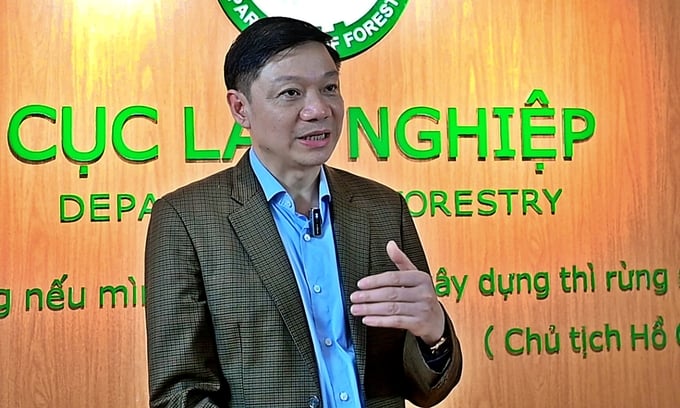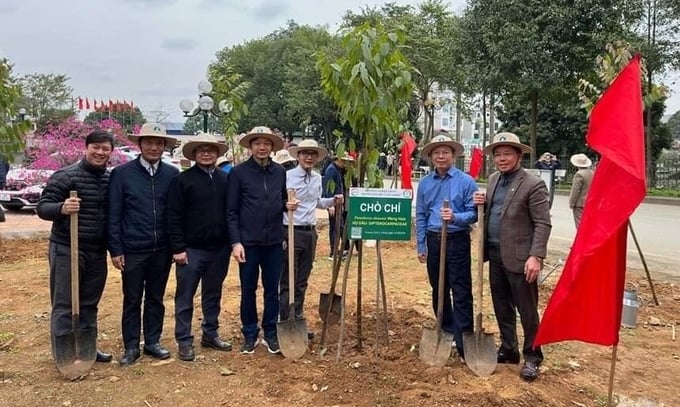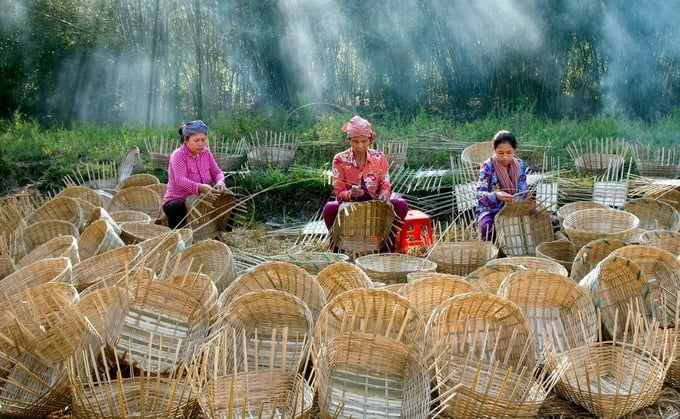June 1, 2025 | 08:48 GMT +7
June 1, 2025 | 08:48 GMT +7
Hotline: 0913.378.918
June 1, 2025 | 08:48 GMT +7
Hotline: 0913.378.918

Director General of the Department of Forestry Tran Quang Bao: "The forestry sector needs to unlock and activate the untapped potentials of forests." Photo: Tung Dinh.
In observance of the International Day of Forests on March 21, Vietnam Agriculture Newspaper conducted an interviewed Mr. Tran Quang Bao, Director General of the Department of Forestry, regarding the sector's development strategy in the face of environmental challenges.
With regards to past management directives, the Ministry of Agriculture and Rural Development has steered the forestry sector towards multi-value and enhanced forest quality. Could you please elaborate on these aspects?
According to assessments and analyses by scientists, forest ecosystems provide significant values to humans, the environment, and the economy, including direct values such as timber and non-timber forest products, as well as indirect values such as non-forest products and services.
With a total forest area of 14.7 million hectares covering over 42% of the country's territory, forests represent an expansive natural habitat in Vietnam. Most notably, forests and their neighboring areas are home to nearly 20 million people in mountainous, remote, and border regions.
Vietnam boasts diverse geographical features, with different regions characterized by varying elevations and ecosystems, resulting in a wide range of forest ecosystems. Each forest ecosystem is representative of a unique home to one of the 54 ethnic groups in Vietnam, complemented by their diverse cultural backgrounds and well-established traditional lifestyles. As a result, the economic value of forest ecosystems is exceptionally rich and diverse.
With the current innovative perspective on sectoral development, and the aspiration for "a modern and innovative forestry sector in Vietnam, developing sustainably in terms of economy, society, and environment, and holding a significant position in the country's socio-economic development," we need to fully utilize the diverse values of forest ecosystems.
We must aim to generate additional resources for society, with a focus on adapting to the rising global climate change challenges. Human's rapidly increasing aspirations for higher spiritual values require a smarter approach to forest resource exploitation. As a result, we must ensure efficient resource utilization without diminishing forest values or soil quality.
Vietnam's international commitments to environmental protection and biodiversity conservation over the last few years are also the highlights of the forestry sector. Consequently, the development orientation for forest usage has been adjusted accordingly, and institutionalized in legal documents. Namely, Vietnam is trending towards gradually reducing direct timber exploitation from forests, and further enhancing forest quality.
On the other hand, Vietnam's policy system aims to address the enhancement of livelihoods for forest-dependent communities. Accordingly, new forest values such as environmental services, forest carbon credits, etc., can bring tangible benefits.

Delegates planting trees at the Lunar New Year tree planting ceremony on the campus of the Vietnam National University of Forestry. Photo: BT.
The United Nations has designated March 21 as International Day of Forests. The theme for this day in 2024 is "Forests and Innovation: New Solutions for a Better World." What are your comments on this theme?
The International Day of Forests was designated by the United Nations General Assembly on November 28, 2012, and was first observed in March 21, 2013. Subsequently, this event has been celebrated annually with different themes every year.
The 2024 International Day of Forests carries the theme "Forests and Innovation: New Solutions for a Better World." This message emphasizes the role and significance of the ongoing revolution in innovation and creativity worldwide, providing humanity with a multitude of solutions and reshaping the way the world operates.
Various technologies have been developed and utilized by humans to exploit and use forests more efficiently and sustainably, thereby bringing people closer to nature and allowing them to appreciate natural values surrounded by increasingly complex and unpredictable climate change threats that directly endanger human security and safety.
Materials originating from forests have been used by inhabitants worldwide throughout the evolution of humankind. However, technological advancements have allowed humans to efficiently utilize natural values, sustainably replace materials such as plastic, construction materials, textiles, medicine, and so on.
Several pioneering countries in Europe, Japan, South Korea, and the United States have utilized scientific and technological achievements to discover alternative materials to wood, such as bamboo. This effort can help humans recognize the vast and underutilized potential of forests.
This development trend is also consistent with the direction of the forestry sector of Vietnam for the future regarding innovation in perception and action to exploit the multi-value of forests. These aspects have been detailed under Decision No. 208 issued by the Prime Minister on February 29, 2024.
Furthermore, the message of the 2024 International Day of Forests also emphasizes the need to restore, develop, protect, manage, and use forests sustainably, by capitalizing on the achievements of scientific and technological progress and innovation, such as satellite technology, unmanned aerial vehicles, biotechnology, plant varieties, or material technology.
With the help of technological solutions, we can build a better world together, with a more ecological environment, a more developed economy, and an improved quality of life.

The development of the forestry economy supports the livelihood stability of ethnic minority communities. Photo: Kieu Phuong - Tung Dinh.
With the aim of achieving these goals, the forestry sector will promptly undertake the following activities:
Firstly, we need to continue enhancing awareness among the public, and society as a whole, regarding the role, significance, and multiple values of forest ecosystems for human life.
Secondly, the sector will effectively implement the Prime Minister's Decision No. 208 approving the Project on developing the multifunctional values of forest ecosystems by 2030, with a vision towards 2050. The project will focus on five main content groups:
1. Developing legal timber sources and increasing value for the wood processing industry: Forming concentrated areas for timber plantation; prioritizing the development of large timber plantations, and the transition of small-scale timber plantations to large plantations in key areas; gradually increasing the proportion of legal timber supply for the wood processing industry from domestic plantations.
Furthermore, developing certified timber plantations with sustainable forest management or designated area codes, in compliance with domestic and international market requirements; advancing precision processing technology to enhance the value added of wood products; utilizing wood processing byproducts for export and to manufacture consumer goods.
2. Developing non-timber forest products and medicinal plants.
3. Developing integrated agriculture, forestry, and fisheries models.
4. Developing forest environmental services: Diversifying and expanding revenue sources from various forest environmental services in compliance with legal regulations, with an emphasis on carbon absorption and sequestration services; reducing greenhouse gas emissions by preventing deforestation and forest degradation, sustainable forest management, and afforestation.
5. Developing eco-tourism, resort, and entertainment activities.
To this extent, the Department of Forestry requires close coordination with relevant ministries, sectors, local governments, associations, businesses, and the community to develop towards a sustainable forestry sector. Additionally, concerted efforts from all stakeholders are needed to unleash forest potentials, and mobilize new resources from the community to participate in afforestation and forest protection activities.
Translated by Nguyen Hai Long

(VAN) Several scientists and farmers are experimenting with soil treatment in some key durian-growing regions such as Cai Lay (Tien Giang), Dak Song, Gia Nghia, and Dak R’lap (Dak Nong).
/2025/05/25/4127-3-073637_820.jpg)
(VAN) Thanks to the promotion from an FAO-implemented project, vegetable production in greenhouses in Moc Chau has seen strong development, from 1.5 hectares in 2021 to nearly 50 hectares in 2024.

(VAN) FAO has recently supported USD 140,000 to implement the project 'Risk mitigation human-animal interface risks through disease control initiatives in pig farming.'

(VAN) The People's Committee of Tra Vinh province has approved an adjustment to the investment policy for the Green Hydrogen Plant project, increasing its area to approximately 52.76 hectares.
![Reducing emissions from rice fields: [2] Farmers’ commitment to the soil](https://t.ex-cdn.com/nongnghiepmoitruong.vn/608w/files/news/2025/05/05/dsc08881jpg-nongnghiep-140632.jpg)
(VAN) Clean rice cultivation model in Thuong Tan commune, Bac Tan Uyen district, is assisting local residents in achieving sustainable agriculture by substantially reducing costs, increasing productivity, and protecting the environment.

(VAN) At the conference to disseminate Resolution No. 68, AgriS introduced its digital agricultural ecosystem and reaffirmed its commitment to accompanying the Government in promoting private sector development and sustainable agriculture.

(VAN) 'Blue Ocean - Blue Foods' initiative is designed to restore marine ecosystems and establish sustainable livelihoods for local communities by cultivating a minimum of 1,000 hectares of cottonii seaweed in the first three years.